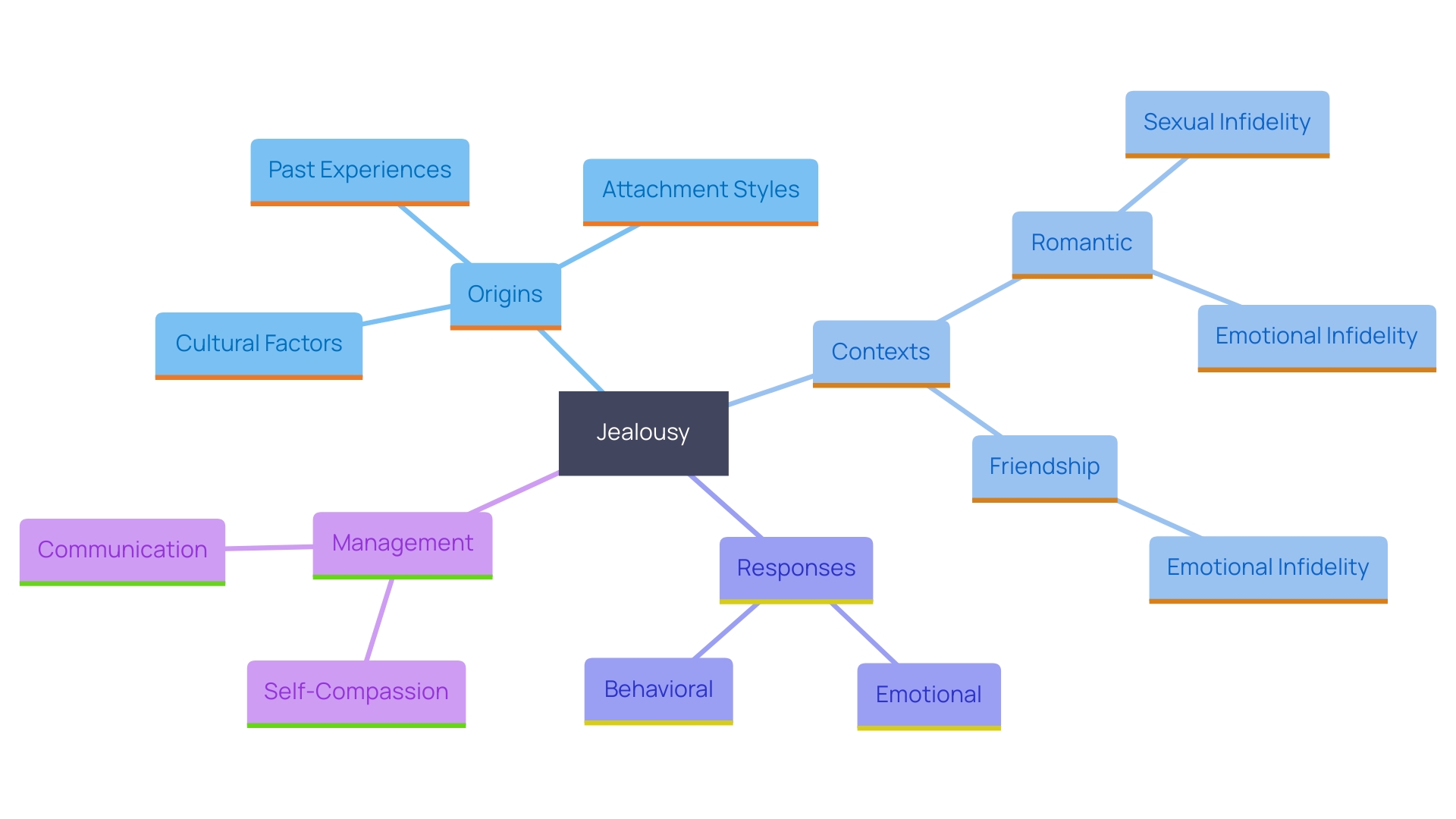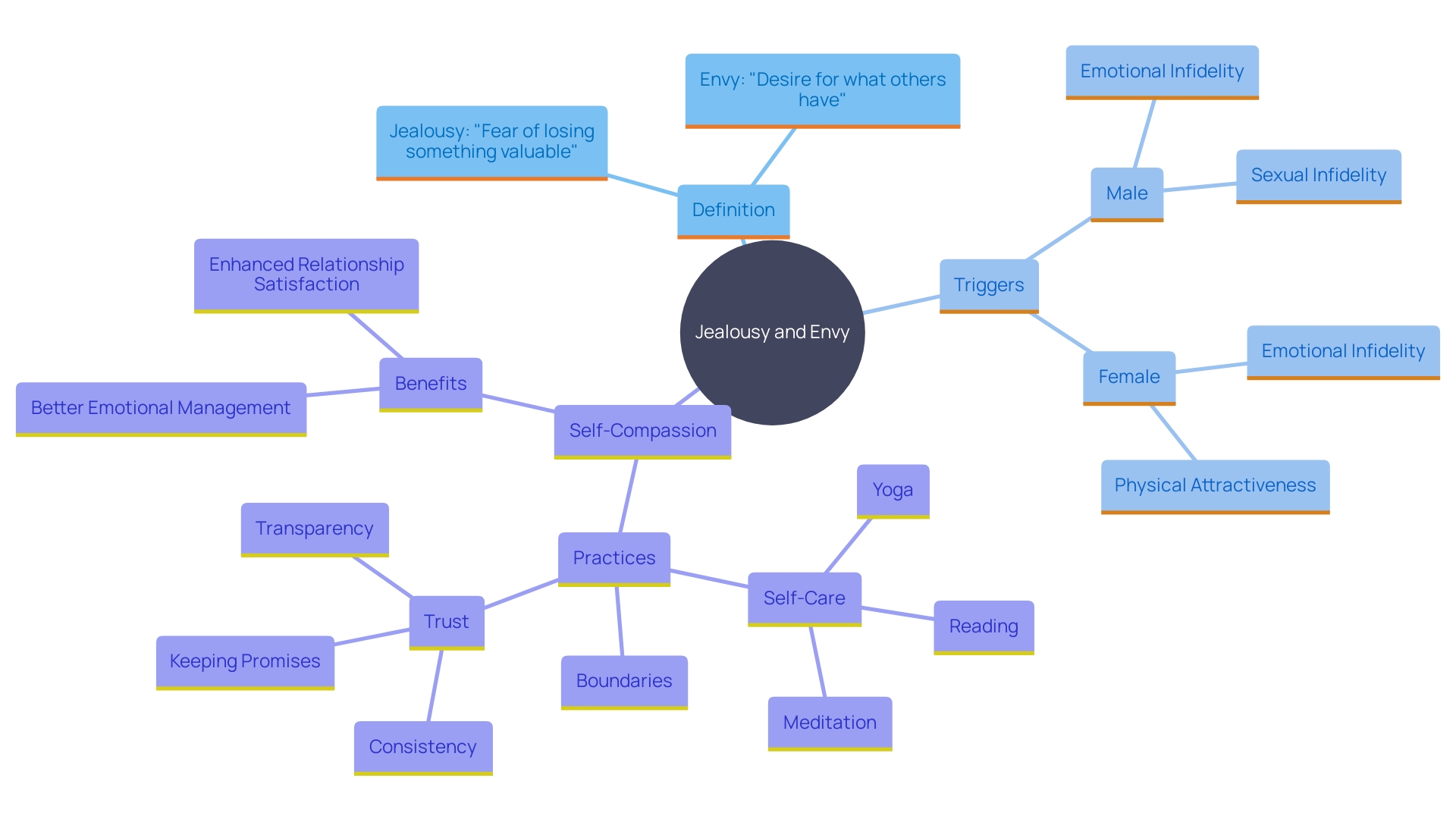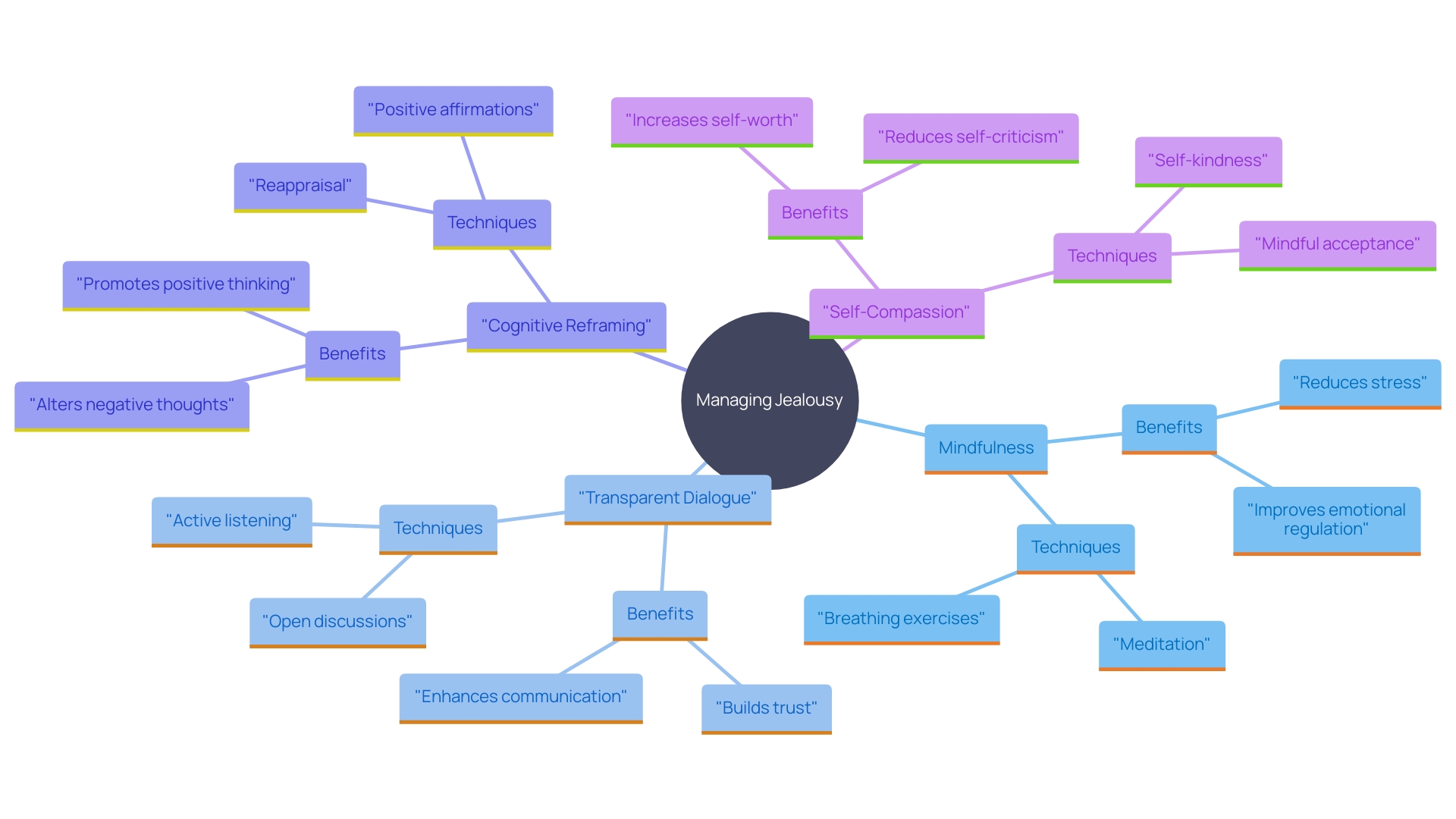PLEASE NOTE:
While the following article relates to your Google search, the services and methods at Goodwin Hypnosis may differ from those mentioned below. Since 2007, we have helped thousands of clients to overcome emotional and behavioral challenges when all else had failed. According to many of them (and their referring healthcare providers), our methods are faster than talk therapy, easier than willpower, and safer than medication. If you’re ready to resolve your issues, skip the article and visit the rest of our website, where you can learn about our unique approach, watch client testimonial videos, and discover how working with us one-on-one could be the solution you’ve been searching for.
Introduction
Jealousy often surfaces as a complicated emotional response rooted in personal insecurities and perceptions. This emotion can arise from various sources such as past experiences, attachment styles, and fears of abandonment. For many, jealousy is seen as an evolutionary trait meant to protect relationships from perceived threats.
In romantic contexts, men and women may react differently to types of infidelity, with men being more likely to feel jealous over sexual infidelity, while women are more concerned with emotional infidelity. Understanding these differences is essential, as they reveal how deeply ingrained these reactions can be.
Exploring the roots of jealousy provides insight into why certain situations trigger intense emotional responses. Research has shown that self-compassion plays a significant role in reducing jealousy; treating oneself with kindness helps in managing emotional reactions more effectively. Cultural influences also shape how jealousy is experienced, with some cultures more inclined towards jealousy due to their emphasis on self-centered thinking.
Jealousy isn't limited to romantic relationships; it can also affect friendships. Feelings of insecurity or fear of abandonment can lead to jealousy, often triggered by perceived favoritism or changes in the friend's life. Open communication is key to addressing these feelings, helping friends understand each other's perspectives and strengthening their bond.
Unaddressed jealousy can result in communication breakdowns and mistrust, deteriorating the relationship.
By examining the diverse triggers and responses associated with jealousy, individuals can navigate their emotions with greater awareness and empathy. This understanding not only fosters personal growth but also enhances the quality of relationships, making them more resilient and fulfilling.
Understanding Jealousy in Relationships
Jealousy often arises as a complex reaction rooted in our perceptions and personal insecurities. It can stem from various sources, including past experiences, including trauma, attachment styles, and individual fears of abandonment. For many, envy is an evolutionary trait designed to protect relationships from perceived threats. This is especially true in romantic contexts, where men and women may respond differently to types of infidelity. According to Professor Mons Bendixen, men are more likely to be jealous of sexual infidelity, while women are more concerned with emotional infidelity. Understanding these distinctions is crucial, as they highlight how deeply ingrained these reactions can be.
Investigating the fundamental causes of envy aids in clarifying why specific circumstances provoke such intense responses. For instance, a study involving 209 heterosexual couples revealed that self-compassion plays a significant role in mitigating jealousy. When individuals treat themselves with the same kindness they would offer a friend, they can better manage their emotional responses. This skill is particularly beneficial in relationships, as it fosters healthier communication and understanding.
Furthermore, cultural factors also influence how envy manifests. Research by Croucher et al. indicates that individuals from cultures that emphasize self-centered thinking are more prone to feelings of envy. This suggests that societal norms and values can significantly influence our emotional responses.
Jealousy in friendships can also be complex. It may arise from feelings of insecurity or fear of abandonment, often triggered by perceived favoritism or changes in the friend’s life. Open and honest communication is vital in addressing these feelings, as it helps friends understand each other’s perspectives and strengthen their bond. Unresolved jealousy can result in communication breakdowns, mistrust, and even the decline of the connection.
By examining these varied triggers and responses, individuals can navigate their feelings with greater awareness and empathy. This understanding not only aids in personal growth but also enhances the quality of their relationships, making them more resilient and fulfilling.

Distinguishing Between Jealousy and Envy
'Jealousy and envy, while often used interchangeably, are distinct feelings.'. Jealousy generally involves the fear of losing something we already possess, like a partner's affection, whereas envy is about wanting something someone else has. Grasping this distinction can provide clarity to relationships, paving the way for healthier reactions.
Research conducted by Professors Bendixen and Kennair has demonstrated that men and women experience feelings of envy differently. Men tend to be more jealous of sexual unfaithfulness, while women are more concerned with relational infidelity. This distinction is crucial because it highlights the different triggers for jealousy among sexes. Professor Bendixen notes, “Men are more jealous of sexual infidelity than women, and women are more jealous of emotional infidelity than men, but do people know about this?”
Another study examined how self-compassion impacts relationship satisfaction. Researchers discovered that self-compassion not only boosts personal happiness but also enhances satisfaction in partnerships for both individuals. This is especially significant in grasping how envy and possessiveness function within connections. By nurturing self-kindness, individuals may reduce feelings of resentment and longing, leading to more satisfying connections.
Furthermore, a study on compersion in consensually non-monogamous (CNM) connections found that diminishing resentment and envy while boosting attachment security can enhance positive feelings towards a partner's other intimate associations. This highlights the significance of tackling envy and addressing feelings to enhance interpersonal dynamics.
In summary, acknowledging the subtleties between resentment and envy, as well as comprehending their distinct causes and effects, can assist individuals in managing their interactions more successfully. By cultivating self-compassion and addressing these emotions, individuals can work towards healthier, more satisfying relationships.

Strategies to Manage Jealousy
Handling jealousy successfully requires implementing proactive techniques that improve self-awareness and mood regulation. Methods such as mindfulness, transparent dialogue with significant others, and cognitive reframing are crucial instruments to assist individuals in recognizing and confronting their jealous thoughts. Mindfulness, for instance, has been shown to significantly improve emotional resilience and healing, as highlighted by Kristin Neff, PhD. Open communication enables a deeper understanding between individuals, fostering a sense of trust and reducing feelings of insecurity. Cognitive reframing helps in viewing the situation from a different perspective, thus mitigating negative emotions.
Incorporating self-compassion into these strategies can also be incredibly beneficial. A study by the Otto Friedrich University Bamberg and the Martin Luther University Halle-Wittenberg found that self-compassion in romantic relationships enhances happiness and satisfaction for both individuals. This practice involves being kind and understanding towards oneself, especially when dealing with personal shortcomings, which can, in turn, reduce feelings of envy.
Furthermore, studies from the University of Rochester indicate that significant others play a crucial role in assisting each other in managing emotions. By contemplating their daily interactions, partners can comprehend each other's feelings and offer assistance, thus lessening the effect of envy. This approach is supported by the findings that 70% of couples report positive effects from counseling, emphasizing the importance of mutual support in emotional regulation.
By fostering a mindset of trust, self-compassion, and mutual understanding, individuals can gradually diminish the influence of envy over their relationships, leading to healthier and more fulfilling connections.

Coping Mechanisms for Dealing with Jealousy
Creating effective coping strategies is essential for managing feelings of envy in a constructive manner. Engaging in self-reflection allows individuals to understand the root cause of their jealousy and helps in managing emotions more effectively. Practicing gratitude can shift focus from feelings of inadequacy to appreciation for the positive aspects of one's relationship, fostering a healthier atmosphere. 'Seeking support from friends, therapists, or even significant others can provide different perspectives and advice, making it easier to navigate these challenging emotions.'. According to a study by the University of Rochester, partners who help each other manage emotions through strategies like situation modification, reappraisal, and distraction reported improved emotional well-being. Additionally, training in self-compassion has been shown to enhance happiness and satisfaction in romantic relationships, as highlighted by research from the Otto Friedrich University Bamberg and the Martin Luther University Halle-Wittenberg. These coping strategies not only help individuals process their feelings but also encourage personal growth and healthier relational dynamics.
Conclusion
Jealousy is a multifaceted emotion that often stems from deep-seated insecurities and perceptions. By understanding its roots, including attachment styles and cultural influences, individuals can better navigate their feelings. Recognizing the differences between jealousy and envy is also crucial, as it allows for more clarity in relationships and paves the way for healthier emotional responses.
Effective management strategies, such as mindfulness, open communication, and cognitive reframing, play a pivotal role in addressing jealousy. Incorporating self-compassion into these strategies can significantly enhance relationship satisfaction and emotional resilience. By fostering a supportive environment, partners can help each other process their feelings and reduce the impact of jealousy on their connections.
Ultimately, developing coping mechanisms and embracing self-reflection can lead to personal growth and stronger relationships. With awareness and empathy, individuals can transform jealousy from a destructive force into an opportunity for deeper understanding and connection, enriching their emotional lives and fostering more fulfilling relationships.




